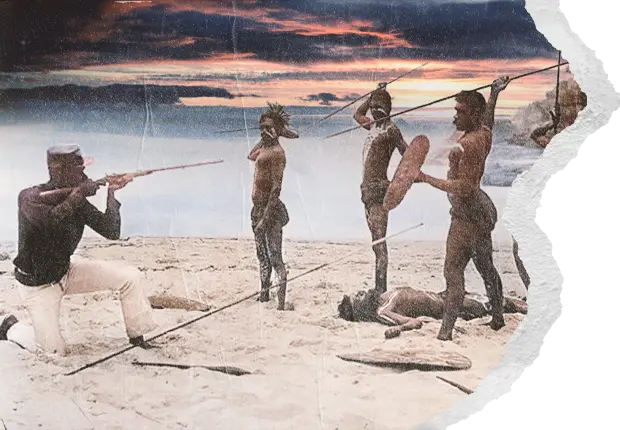Go North, Young Man
It’s late afternoon on a Friday. It’s hot, it always is, though especially so during the wet season where the smothering humidity never relents. Fortunately there is air-conditioning here at the Hidden Valley Tavern, a pub about 20 minutes outside of Darwin, capital of Australia’s vast Northern Territory. You may not spot it immediately though, for it’s obscured at its front by a drive-through bottleshop and wedged down the side of an electrical-appliance retailer in a nondescript commercial area.
It’s an interesting venue, though not especially big, with just a moderate bar. Rather the decorations are what stand out, all red and chrome, a chequered flag floor and walls packed with Australian motorsports memorabilia. One glance around and it’s very clearly those who work with their hands that are most numerous inside. Work-site clothing, adorned with red dust and oil, is the giveaway. There’s a few button-shirted car salesmen too, and along with some blow-ins not necessarily coming from any sort of work at all. But one thing is certain, most of them, but for a handful, are men.
The atmosphere is upbeat. How could it not be when the weekend is so close? The beers go down too easily alongside the plates of sausage rolls and curry puffs the pub’s owner has generously laid out, always welcome in these expensive times.
And then, once all are positioned at their tables or crowded around the bar, the smokers back inside, the shades start to lower. An announcement is made and the music starts. From a private room at the back the afternoon’s entertainment emerges. She’s fairly attractive, moderately tattooed, and, one would suspect, carrying some generous top-half enhancements.
She steps onto the platform, a converted mechanics hoist no less, which begins to raise until it reaches just above waist height. Then she begins to work her way through her set, which, it should be noted, is far from vanilla. All clothes are off and introduced at various points throughout are ice cubes and wax, concluding with a cleansing bubble bath. Best to stay a couple of rows back lest you cop some spray. Probably wise to keep an eye on your drink too otherwise it might be an ice cube up on what it came with.
All up, we’re done in about 15 minutes, the crowd dissipating fairly quickly thereafter. For our afternoon’s entertainer, she’ll hit the highway to the next pub on the way into Darwin City before settling into one of the city’s strip clubs for a busy Friday night. For most of the blokes there, they briskly finish their beers and head back to their families to start the weekend, though some may reappear in the city later. But for all of them, after a long, hot day, and indeed a long, hot week, a cold beer and a cheeky show is a deserved and distinctively ‘Territory’ way to blow off a little steam.
Like the clientele at the Hidden Valley Tavern, Darwin is a city filled with blokes. And it’s not just a manly city, it’s Australia’s manliest capital by a mile. The average ratio of men to women in Australian capital cities is 98.5 to 100, with every single one adhering to this lady-heavy trend. Darwin, by contrast, has a ratio of 105.8 men to 100 women. In fact it stands stop the sex-ratio tree, save for a few remote mining towns and military bases.
So what is it about Darwin that’s driving such a large number of men to go there?
The obvious answer would be economics. In the Territory, economic activity is concentrated in male-dominated industries like agriculture and mining. And yet these two industries together only employ around 10,000 people, dwarfed by employment in retail and wholesale trade, personal services and Government and community services. So if it’s not economics, what is it?
From Hidden Valley Tavern one heads West along the Stuart Highway, the main conduit into the city. Most of the drive in is barren highway, punctuated unevenly by desolate commercial buildings and dry scrubland. But as you approach the city the buildings start to become more numerous, as does the vegetation. Giant palms torpedo out of the landscape, providing welcome shade and a shift in the vibe. Once in the city, one should resist the lure of Mitchell Street, with its shady terraces and frosty beers on offer. On a Friday evening it’ll already be thronging with sparsely clothed backpackers, their drunken ramblings drowned out only by the manic buzz of a million cicadas.
Counterintuitively, one should head north up to East Point for an idea of what Darwin truly is. Stepping onto the point’s scraggy, rocky outcrop the calm azure waters of the Arafura Sea meet your gaze. It feels as if you can see all the way to Asia; though it’s actually the nearby Tiwi Islands. At your back, beyond the city and but for a few remote outposts, it’s mostly thousands of kilometres of scrubland and desert back to civilization. And what does one feel when standing here? Undoubtedly at the extremity of a country, nee a continent. For this is what differentiates Darwin from other cities in Australia: it is Australia’s frontier city.
But first we should characterise the frontier. For perspective, Darwin, perched as it is near the top of Australia’s middle northern extremity, is closer to the small Asian nation of Timor Leste than to any other Australian city. Adelaide is 3,000km away, further still the power centres of lefty Melbourne or elitist Sydney. But by virtue of being so remote it doesn’t take long to be refreshingly beyond mobile-phone coverage. Nor does it take long to arrive at true wilderness areas, such as the stunning Kakadu National Park. And matching this geographic dimension is a harsh climate, ever a big part of living at the frontier. For Darwin is a place with two seasons, the dry and the wet, but defined mostly by the oppressive ‘build-up’ to the latter, enough to drive Darwinians “troppo”. And then there’s Australia’s unique flora and fauna. All I’ll say is, check your work boots always, your bedsheets too.
Another important characteristic of the frontier is community. In an age where one seldom knows their neighbour, where loneliness is rife, and where social interaction is predominantly online, the existence of real people one knows and interacts with is welcome, as one does at the frontier. Why? Because there you might actually need your neighbour. Perhaps to borrow something, a chainsaw or a trailer. Or maybe a request for assistance in the face of some probable adversity. An unwritten bond supported not by the prospect of any guaranteed gain but by a chosen existence shared together in such a harsh and challenging place. A duty almost, to one’s neighbours and ones’ mates. After all, the community of Darwin has persevered and rebuilt, both after the Japanese brought their bombs during WW2 and after Cyclone Tracey visited in 1974.
One might also think that the weather and the animals of Darwin are absurd, especially when compared to the normal state of existence in any regular metropolis. Why have some of the most beautiful and pristine beaches for example if you can’t actually swim on them? But such absurdity, understandably, will give rise to unseriousness. One that harks back to a larrikin spirit that was long a defining and revered pillar of Australian culture. The same larrikin spirit that helped Australia’s farmers, soldiers and workers cope with its vast distances and demanding conditions.
How do we know it persists? Well, Darwin’s main newspaper, the ‘NT News’, is a good starting point. You do of course get the hard-hitting front pages when it’s called for, but you can also expect such gold as: “G’day, Bait!” or “Darwin route a first for Virgin”. Or perhaps the city’s unsanctioned but wildly effective branding for attracting tourists, inviting that we “CU in the NT”. Even the city’s favourite dish, the spicy lakhsa, makes little sense in such a hot, humid place. It’s all probably why Darwin vastly eclipses all other capital cities in alcohol consumption. For at the frontier beer is the culture, as well as the coping mechanism.
This erstwhile larrikinism is but one component of the traditional Australian culture that persists in frontier Darwin, alongside a pride in the national identity. Australian flags are many, so too are Southern Cross tattoos. Encouragingly, Australia’s national day, ‘Australia Day’, is punctuated less by protests as it is in other capital cities, than by BBQ’s, get-togethers and a ‘ute run’ culminating in a fairly rowdy (as I can attest) piss-up at the Noonamah Tavern. This pride, so evident and overt at the frontier, evidently accompanies the values of mateship, hard work, and the fair go. These virtues never really died out at the frontier because neither did the forces that historically shaped them.
On the subject of culture, Darwin has higher proportion of Aboriginal people than any other capital. Darwin serves as the home, temporary or otherwise, for many who’ve sadly become disconnected from their tribes and traditional lands. One can’t pretend they don’t exist as many in Australia’s southern capitals prefer to do. This makes the frontier important because it serves as a real and contemporary illustration of the continuing impacts of British settlement, one in which a man becomes wiser and more understanding from experiencing.
A further, and perhaps more positive and enlivening characteristic of the modern frontier is freedom. The Territory is subject to the same federal laws as other Australia states, but at the local level things are different. As an example let’s start with the great Territory pastime of taking the tinnie out fishing. Unlike all the other Australian states, in the Territory one does not need to register their boat, nor does the captain have to have a skipper’s ticket. And, tellingly, one can legally consume as much alcohol as one pleases when on the water. What else? Well, a motorcycle license is almost comically easy to obtain, highway speed limits, which up until 2007 didn’t exist, remain 20km/h higher than anywhere else, one can purchase fireworks legally, albeit only one day a year, and, if one is so inclined, all forms of sex work are decriminalised.
But it’s not simply laxer laws that make a frontier free. Just as indicative is the reduced ability or willingness of the state to exercise authority there, be it due to limited manpower, a hesitancy to offend, or sheer distance. In Darwin, the police, reasonably numerous and well-trained, have an immense workload due to the Territory’s high crime rate. Using a recent year’s homicides as an example, there were 15 in the Territory whilst in New South Wales, 32 times more populous, there were 79. This workload means that the cops simply have more to worry about than when Darwinians take a piss in public or carry an unsafe trailer load.
With the nature of the frontier now in mind, why would a man wish to go there? The first reason is opportunity. But we’re not talking about mere economics, a simple arithmetic of where one can earn the most money. Rather, it’s something more elemental than that. The identification and motivated pursuit of something meaningful that makes a man more than he was before.
But yes, the most obvious branch of opportunity is professional. As ever, there are big dollar opportunities that exist in the Territory’s mines or in its Government. However beyond that there’s the possibility to get a job that would be out of reach, or at least massively improbable, in a larger, more crowded metropolis. But this isn’t exclusively opportunity for the formally educated, for even the unskilled are afforded an opportunity. Here the same applies to the labourer and the warehouse operator. And all can be proud, not that they earnt some extra money, but that they actively sought more for themselves. Enduring elevated discomfort and fewer conveniences, they ultimately planted the flag of their ability, initiative and drive further up the mountain where it isn’t easily dislodged.
The second branch of opportunity is personal. To see and do things that one could not see and doelsewhere. Where one can attain a pleasurable and fulfilling lifestyle of the sort only possible when wilderness areas to camp and fish in are only an hour or so away. For pursuing bold hobbies such as these, dirt-biking or hunting requires space, often unmonitored and uncontrolled.
The second draw of men to the frontier: to escape. But escape what? Depends. Maybe it’s the rat race. The corporate drudgery. The “9 to 5.” Yes—but what else? Escape to nature? Nobly embrace solitude or live off the land? The mythical cabin in the woods, or maybe the full McCandless, fading into the wilderness never seen agan? If such are a man’s desires then he should probably look to a further outpost over Darwin. Most men have commitments and the need to earn an income. But just maybe, a small, remote city surrounded by accessible wilderness offers an alluring alternative.
Seemingly more likely in this day and age is escaping expectations. It could be as simple as wearing shabby clothes or thongs on a night out; though it undoubtedly goes much deeper than that. Instead an escape from what society attempts to impose upon men. A society we know to prioritise safety and comfort at most costs, which demands men eschew traditional masculinity in favour of vitality-draining femininity. A society that disdains and discourages overt acts of drive, ambition or competitiveness that should instead be rewarded. The frontier, by contrast, is harsh, dirty and oftentimes dangerous. Its hardened society imposes no such expectations because it cannot, nor would it.
And in same this vein the society that diminishes and feminises men unsurprisingly acts to degrade their skills and abilities. No need to read a map, change a tyre, or wire a plug. Don’t try to fix anything either, it will probably void some incomprehensible warranty. Instead just hire someone and add to the ancillary profit stream of a rootless global conglomerate. But we know men derive stimulation from the solving of problems and the application of practical skills. And at the frontier one will actively be required to dig, saw and lift, if one wants something done in a timely manner. In exercising self-reliance and independence to accomplish these tasks, men can gain back purpose and esteem there, with a cold beer the simple reward.
But there are negatives. Too many men this writer has come across desire to escape responsibility, such as those of fatherhood or the trivialities of life generally. Truly unfortunate. There are many such men scattered around the city drinking and gambling their problems away. But at least they’re doing it on their own terms, where they won’t be disturbed—an act of escape all the same.
And so for myself, a man in Darwin for several years, what were my reasons? It was probably two things. Definitely the opportunity to be part of, and to take on responsibility within, a construction project of great significance, planting my career flag far up the mountain.
And the second? This one is slightly harder to pinpoint. Perhaps just being somewhere different. To go fishing, however unfruitful it always ended up being. To smoke vast quantities of meat, brew beer and play golf, then on alternate weekends, to hike and mountain bike. To escape the searing midday heat in the backyard pool, talking shit with mates. And to then later relocate to the pub and talk even more shit.
And, I suppose when it comes down to it, like many of the blokes in Darwin, to be at the Hidden Valley Tavern on a hot, hazy Friday afternoon.

































